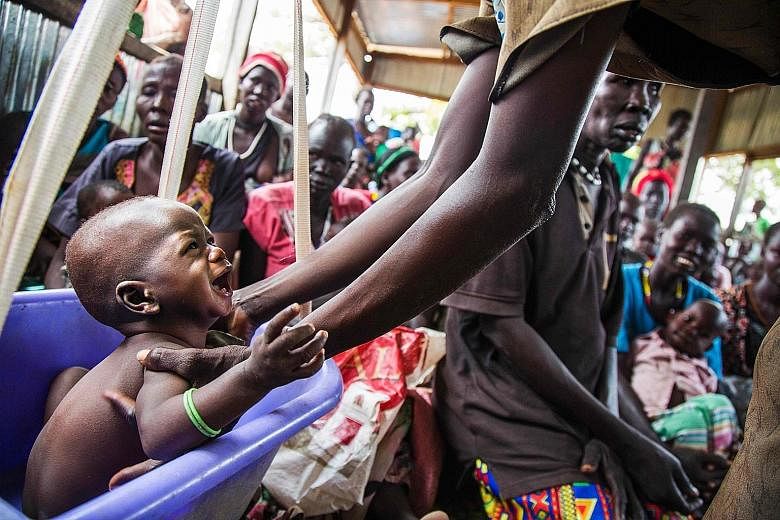NAIROBI (Kenya) • At the beginning of this year, the United Nations made one of its boldest requests for funding.
It needed billions of dollars to fund a humanitarian response, said Secretary-General Antonio Guterres, or as many as 20 million people might starve to death.
Five months later, the results of that appeal are dismal.
The UN has raised about a third of its goal, and there is little reason to believe that much more is coming. The funding is for four countries facing massive hunger crises: South Sudan, Somalia, Nigeria and Yemen.
Of the US$6.1 billion (S$8.4 billion) requested, only US$2.2 billion, or 36 per cent, has been pledged.
"It means, quite simply, that large numbers of people, particularly children, will suffer and die," said Mr Andrea Tamburini, chief executive of Action Against Hunger.
The funding shortfall comes at a particularly troubling time, with some regions in the affected countries about to enter the "lean season", as families exhaust their last reserves from the previous harvest.
-
U.N. STATISTICS ON UNMET NEEDS
-
Of the US$6.1 billion (S$8.4 billion) requested, only US$2.2 billion, or 36 per cent, has been pledged.
In Yemen, 17 million people are considered "food insecure".
In north-eastern Nigeria, 1.8 million people are in need of food assistance.
Across Somalia, more than 275,000 children are facing severe malnutrition.
In South Sudan, 2,800 people are fleeing worsening violence and looming famine every day.
The UN's biggest shortfalls are in Nigeria, where only 28 per cent of US$1.05 billion requested has been raised, and in Yemen, where 23.7 per cent of the US$2.1 billion appeal has been funded.
"When you can no longer feed, say, all malnourished children in a certain age group in a given area, you operate a form of triage. It is a moral wrench to do this, but we don't have much choice," said Mr Andre Vornic, a World Food Programme (WFP) spokesman.
In Nigeria, the UN has also been unable to provide thousands of people with 15 litres of clean water per day - seen by many in the humanitarian community as a basic standard for survival.
"This will have an impact in morbidity and mortality, particularly for children," said Ms Samantha Newport, a spokesman for the UN Office for the Coordination of Humanitarian Affairs.
Raising funds for hunger crises, particularly in Africa, is never easy.
In 2011, the UN struggled to galvanise donors during a famine in East Africa. In Somalia alone, 260,000 people died during that crisis, though a lack of funding was not the only reason for that massive loss of life.
The international community's response had been slow even before the fund-raising appeal began, and aid delivery had been complicated by Al-Shabab militants.
Many in the aid community are worried that the Trump administration's Budget, which proposed massive cuts to foreign aid, would be disastrous for the international humanitarian response.
But the United States is still donating more than other nations in many cases. In Nigeria, the US is contributing US$25 million to the WFP budget this year, three times as much as Canada, the next-largest donor.
UN officials are hoping that the US would give more to the four hunger crises, but they say that the problem is a global one, with wealthy European and Middle Eastern nations contributing only relatively small sums.
Some aid officials have said privately that they believe donors have declined to contribute to Nigeria's humanitarian package because they consider the country to be relatively wealthy and capable of contributing more to its own crisis.
Nigeria is the largest economy in Africa with the biggest population: roughly 180 million people. Its government has largely played down the scale of the humanitarian disaster in the north-east.
WASHINGTON POST

